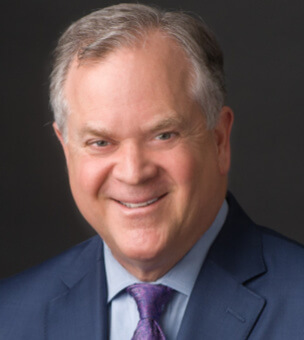875. A Talent for Building Relationships
Benjamin R. Case

“I got a phone call from the Dean of Students at Catawba College [Ben’s alma mater] who was being invited to take over the Admissions office. He asked if I would be his number two in Admissions. I said, sure, what do I need to do? He said, ‘Just come here, we’ll interview, and we’ll make sure that you take the job.’ The very next day I got a call from a guy who was in something called Development [at Catawba College] and he said, ‘Ben, I need a number two in my Development shop. Would you consider doing this? And I can pay you a thousand dollars more a year then Admissions.’ So for a thousand dollars more, I took the job in Development with someone that I didn’t know anywhere near as well as I knew the Dean of Students, and I knew nothing about Development. Matter of fact, my first question was ‘What’s development?’ I took that job, and 41 years later I’m still in fundraising.”
Benjamin R. Case is a professional fundraising consultant, who has served in the nonprofit sector for 41 years as an advancement professional, senior manager and leader. He has personally been involved in the successful solicitation of over $1.1 billion in gifts and worked for and been engaged by organizations that have raised $4.8 billion. His fundraising experience includes working with The Metropolitan Opera in New York, Duke University and Children’s Hospital of Philadelphia, among others. He recently launched an online learning 12-series webinar, “The Daily Dozen: Habits of Highly Successful Fundraisers.” He is also the author of 21 Tips for Highly Successful Fundraisers, an international best-seller in nine business categories in six countries.
The Most Impactful Turning Point?
“I was a Catawba College for four years when there was a change in leadership, and my boss, the Director of Development, left and started his own consulting company. I thought I was hot enough and good enough and strong enough to become the number one in the fundraising operation. The new president made it clear that he didn’t think that was the right way to go. I started interviewing to find what was next and got a call right away…from Roanoke College. They needed someone to start their planned giving program. I loved Catawba College. I told my wife when we got married, don’t ever ask me to leave Catawba College. That’s how much I cared for this place. But leaving Catawba has enabled me to travel the world, make more money than I could ever imagine and have a career that I never imagined. If I had stayed there, I may have never developed into the person that I am now.”
The Most Powerful Lessons and Experiences?
1) When Ben’s boss, the man who had hired him at Catawba College, left the university, Ben thought he was good enough and strong enough to become the number one in the fundraising operation. The new president disagreed. “I think there was immaturity on my part of thinking that I was probably better than I was at the time, that I knew more than I knew. I really think it’s important to own any experience like that and to really look at what you need to learn from it.
2) At 31 I became vice president for Development of Operations, which was an honor and a great opportunity. I worked for wonderful people, had a wonderful team that worked for me. I had a great mentor, Jack Hills. I went into him one day–and I think this is an important lesson for people–and told him…I’m interested in managing other people. And he said to me, “Ben, before you can manage others, you have to manage yourself.” I thought I was a pretty good manager myself. I probably was. But what he was doing was giving me both a challenge and a great lesson. He is somebody who really helped me grow in my career.
3) September 4, 2001 I opened my own consulting business. That’s one week before the Twin Towers came down. I mean one week before the world comes to an end, I opened my own business and I thought, man, this was the stupidest thing I’ve ever done. But we paid the bills from the first day. Within three months, I had a full book of business. One of the great lessons here was the relationships that I had through all of that work experience enabled me to visit with people and tell them what I was doing. They said, yep, here’s where I need help. Luckily I’m very good at building relationships with people and they then gave me the opportunity to work for them and work with them to help them be highly successful fundraisers, managers and leaders. And that’s what I’ve been doing in my own business ever since.
4) I think it’s a difficult thing for all of us to match our skillset to the opportunity, to know ourselves well enough to know what our skills are, to know what we like to do and define and match that to a really good opportunity. I counsel a lot of people in their careers and I always tell them to find a fast-moving stream and hold on. There are a lot of different analogies you can make around that, but the idea is finding something that is moving fast, that’s challenging for you, and that’s using your skillset. Do the best you can at that work and that will take you somewhere good. That’s what has happened to me.
On His Bookshelf
21 Tips for Highly Successful Fundraisers, by Ben R. Case
Connecting With Benjamin R. Case
Website: www.focusedonfundraising.com/
Facebook: facebook.com/Focused-on-Fundraising-1136932446442325/
Twitter: twitter.com/MajorGiftTips
LinkedIn: linkedin.com/in/benjamin-case-2707141/
Free Gift
Ben Case’s book 21 Tips for Highly Successful Fundraisers is available free on his website.
Subscribe to the Podcast Free:
Careers: Fund Raising
Topics: Fund Raising, Relationships in Business


